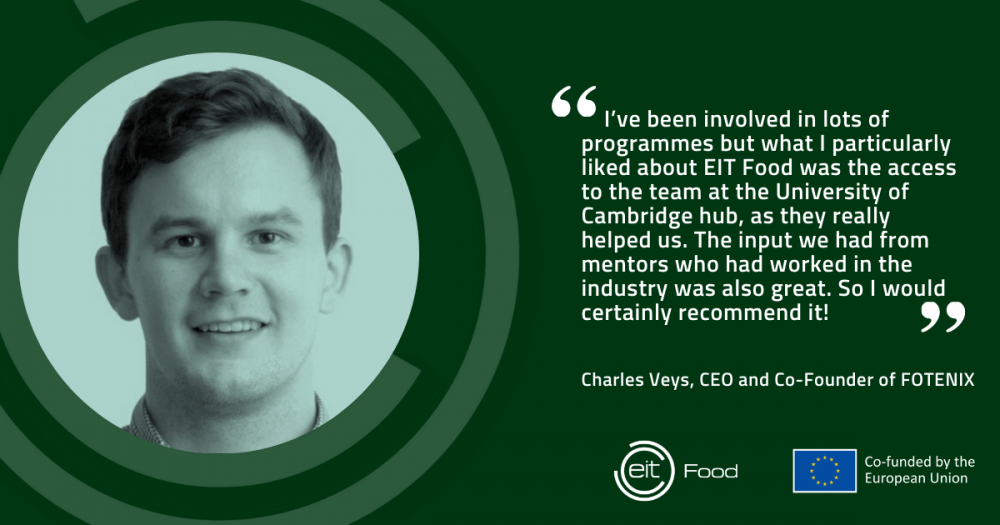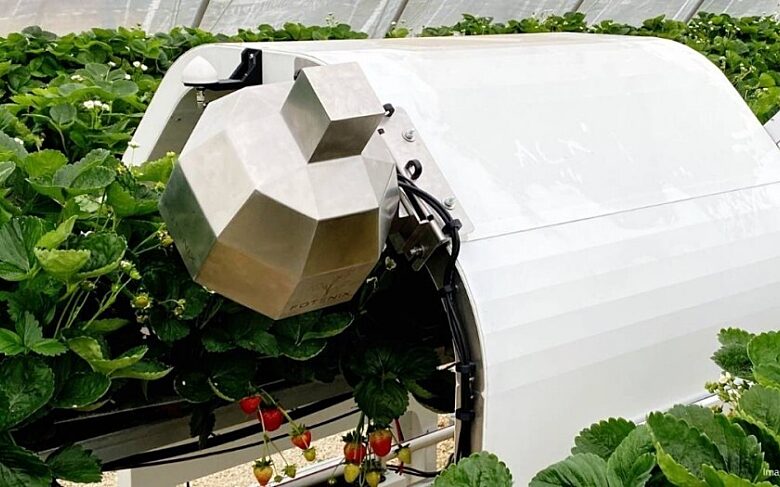The idea: machine learning to monitor crop health
FOTENIX is enabling data driven farming through their technology which helps farmers to monitor crop health. To do this they combine cameras which deploy colours of light, with machine learning to analysis crops for pests and diseases. The LED cameras record how light bounces off the crop in different angles, to provide three-dimensional multispectral imaging. This imaging data is entered into FOTENIX’s cloud-based platform, which compares the images to existing libraries to provide a crop health diagnosis. FOTENIX is empowering farmers to detect crop disease at an early stage, so they are able to take action before a disease spreads to neighbouring crops, threatening their overall yield.
The technology is easily embedded into the farmers’ existing equipment, so the farmer does not have to purchase an expensive crop diagnostics product. Instead, FOTENIX act as an intermediary between the crop and the machinery used to cultivate it, enabling laboratory analysis of crop health, at an economic cost.
Who is behind the idea?
After several years of technical development, FOTENIX was formed in 2018 by Charles Veys. As Founder and CEO of FOTENIX, Charles completed a PhD in agricultural diagnostics with the intention of setting up a business. He wanted to create an affordable solution to a problem that farmers experience on a daily basis. With pressures put on farmers to maximise yields amidst climate change, and with increasing bans on many pesticides, monitoring crop health is an important and daily requirement for farmers. As such, with a PhD in agricultural diagnostics, Charles was equipped with the knowledge and skills to address this need.
What are the benefits of crop diagnostics?
Crop diagnostics enables farmers to monitor their yields for signs of pests and disease. While some crop diseases are easily detectable, such as ‘powder-mildew’, which is visible as it grows on the plant, other diseases are not as visible to the human eye. These diseases have an initial phase which is parasitic, but the plant displays no visible symptoms until months’ later, when it is too late treat the infection.
FOTENIX’s technology is able to detect many invisible crop diseases in half the time than if detected by the human eye. This enables farmers to target the infected crop at its early stage before the disease is beyond treatment and before the disease spreads to other plants. In this way, farmers can protect their yields and they also use less pesticides or fungicides, saving money and protecting the environment.
FOTENIX facilitate crop diagnostics for farmers by informing them when there is a problem on the farm and where exactly those problems are occurring. They also connect directly with the farmer’s agronomist, empowering them to provide a crop health diagnosis from a distance. This has been especially important during Covid-19, where socially distanced working has been a priority.
Support from EIT Food Accelerator Network
FOTENIX participated in the EIT Food Accelerator Network in 2019 where they gained tailored support from the regional hub led by the University of Cambridge. They were able to gain insights into some of the challenges with building and accelerating a business, such as intellectual property (IP) management and raising equity. The FOTENIX team also received introductions to investors and industry partners, so they could build worthwhile connections that were able to share their opinions and input into their technology.
By taking part in the programme, FOTENIX were also able to build relationships with like-minded peers. After completing the programme, participants join an Alumni group. The Alumni enables participants to share their experiences and offer advice to commonplace obstacles around operating and accelerating a business in the agrifood space. For FOTENIX it was important to learn from other startups and be part of a community that supports the ventures of others.
Testimonials

“In particular EIT Food has a European focus, whereas a lot of programme I’ve done before are very UK-based, so it’s nice to meet peers across Europe. It can be quite lonely starting out and operating a business, so it was nice to meet people with shared interests and passions. Talking to peers allows you to share experiences and learn from one another. I stay in touch with many of them today", Charles Veys, CEO.
“When I came across EIT FAN it came highly recommended, but you’re always a bit sceptical about how it’s going to go. But I would certainly recommend it. It was one of the few programmes that is very tailored and targeted. It was also one of the only programmes that actually helped to introduce us to investors and industry partners, which is paramount to building connections. They introduced us to some of the big European food processing companies which was great. It was very interesting to get their thoughts and input into the technology. So I would certainly recommend it!”, Charles Veys, CEO.
Learn more about FOTENIX
In this video, learn how FOTENIX is providing next generation crop analytics
Visit their website: https://fotenix.tech/
Follow them on Twitter: @fotenixtech
Learn more about EIT Food’s Accelerator Network here
More News from EIT Food West










